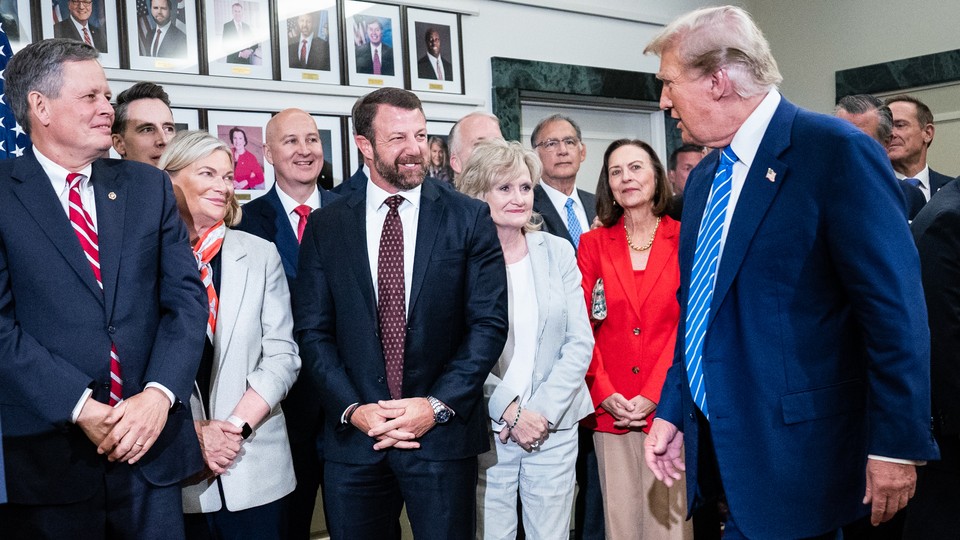Do GOP Senators Have Any Backbone Left?
5 min read
If you had predicted before the election that Donald Trump’s second administration would seek to hand some of the most sensitive and powerful roles in government to a Fox News personality (Pete Hegseth, nominated for defense secretary), a recurring Fox News guest who is also featured frequently on Russian state-controlled media (Tulsi Gabbard, nominated for director of national intelligence), and the target of an ongoing House Ethics Committee sexual-misconduct investigation (Matt Gaetz, nominated for attorney general), you might have been accused of fearmongering. The notion would have sounded like a beyond-worst-case scenario cooked up to scare moderates out of voting for Trump. And yet that scenario is now upon us.
Following the announcement of Trump’s unconventional slate of Cabinet picks, serious Republicans attempted to make clear that they are still in charge and won’t let things get out of hand. The Gaetz pick, in particular, drew immediate derision. Gaetz “will never get confirmed,” an unnamed Republican senator told Fox News. Senator John Cornyn rolled his eyes and let out “an audible snort,” while Gaetz’s Republican House colleagues reportedly gasped when they heard the news.
Maybe the Senate caucus really will draw the line somewhere—perhaps at Gaetz, perhaps at one or both of Gabbard and Hegseth. But there is something disconcertingly familiar in the confident yet carefully hedged assertions that the old-line GOP will stop this madness. It is exactly what Republicans said would stop Trump from receiving the nomination in 2015, from winning the presidency in 2016, and from reclaiming the party’s leadership after the ignominy of January 6. “I don’t think he’s a serious candidate,” Senator Lisa Murkowski said yesterday, of Gaetz. That is almost a verbatim repetition of what elected Republicans once said about Trump.
At every step along the way, Republican elites have assumed that they could stop Trump later. But when the decisive moment arrived, they discovered that the cost of confrontation had gotten higher, not lower. Opening a breach with a man whom the base had come to admire, and then worship, would imperil their own ambitions, not just Trump’s.
The Republican affirmations of support for Gaetz have been less ambiguous than the background statements, facial contortions, and guttural noises expressed against him. “There’s no question we’ve had our differences,” Senator Markwayne Mullin acknowledged, referring to Gaetz. (The “differences” to which Mullin was tactfully alluding presumably consist of, as he once described to a CNN reporter, Gaetz’s penchant for showing pictures of “girls that he had slept with” to disgusted House colleagues and bragging about his creative use of erectile-dysfunction pills.) Still, Mullin said, “I completely trust President Trump’s decision making on this one.” Mullin granted that Gaetz would have to answer “a lot of questions that are gonna be out there.” While this technically leaves open the possibility that Gaetz supplies a “wrong” answer, it also implies that there is a correct one that would justify confirming an alleged sex pest whose primary qualification is a willingness to abuse power.
Senator Lindsey Graham’s reaction to the Gaetz announcement was a microcosm of his Trump-era career. “I don’t know yet, I’ll have to think about that,” he initially told reporters yesterday afternoon. By evening, having evidently given the matter all the necessary thought, Graham had transformed into a loyalist, pleading with his fellow partisans to join him in submission. “Elections have consequences,” he explained on Fox News. “To every Republican: Give Matt a chance.”
Senator Tommy Tuberville not only pledged his support for Trump’s slate of nominees but threatened primaries against any Republicans who dissent. This is deadly serious business. Loyalty to Trump is the main basis on which Republican-primary voters choose their nominees. Trump has proved willing time and again to handicap the GOP’s prospects of holding seats—thus undermining his own base of support in Congress—by endorsing the most slavish loyalists over slightly more independent and much more electable alternatives.
At the moment, having won reelection with an actual popular-vote majority, and about to enter his tenth year as the party’s most prominent figure, Trump’s command over its base is at an apogee. To block Trump’s selections would be not only to flout his authority, but to deny a narrative to which the base has subscribed: Trump as the innocent victim of a relentless “deep state” conspiracy. If Republican senators prevent Trump from installing the allies he says he needs to defeat that vast conspiracy, their voters may well conclude that those senators side with Trump’s enemies.
The Republican lawmakers who justified Trump’s election on the grounds that they would restrain his worst impulses now realize that his worst impulses have arrived, and they’re not so easy to restrain. One can see the rationalizations forming in advance. Do legislators really want to blow up their relationship with Trump before his term has even begun, forfeiting their chance to exert influence over policy and staffing? Wouldn’t it be better to let Trump have his nominees, but hold them to account with strict oversight hearings? “What I’m hearing privately from a few key GOP senators: yes, they’d prefer to not have a messy fight over Gaetz,” the CBS News reporter Robert Costa posted this morning on X. “Not their favorite. But they also don’t have a lot of energy for pushing back. Trump runs the show, they say. If Gaetz can reassure them, they’re open to backing him.”
Old-guard Republicans appear to be in the middle stage of a familiar Trump-era progression. It begins He’d never do it before moving on to We’ll stop him if he tries and finally settling on There was nothing we could have done anyway. As they advance through these stages, they will cede Trump more and more power, which will only vindicate their ultimate fatalism. How could they ever have stood up to somebody so strong?



